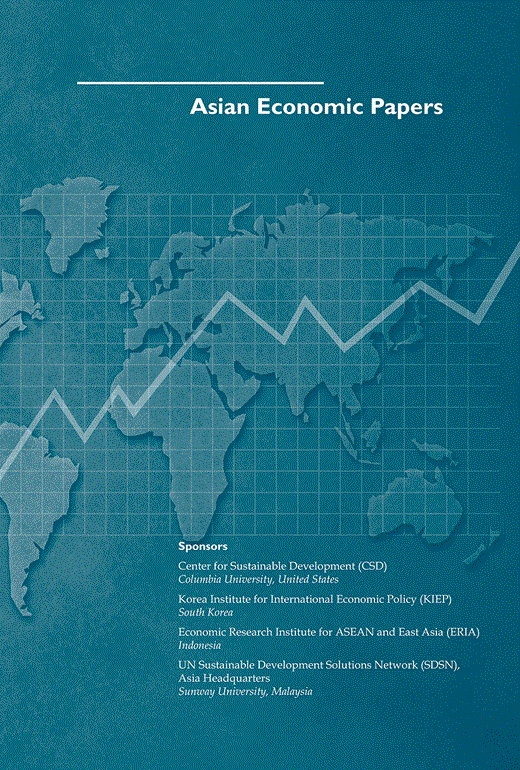泰国低碳情景、碳中和和净零排放综述:对温室气体排放和宏观经济的影响
IF 5.3
3区 经济学
Q1 ECONOMICS
引用次数: 0
摘要
气温和天气模式的长期变化导致全球气候变化。燃烧煤炭、石油和天然气等化石燃料的人类活动已被确定为气候变化的主要驱动因素。气候变化的极端天气事件,特别是洪涝和干旱,已经造成了严重的经济影响。除非采取变革性和全面的适应措施,否则这些影响将继续加剧。《联合国气候变化框架公约》(UNFCCC)下的《巴黎协定》旨在将本世纪全球气温上升幅度控制在工业化前水平2摄氏度以内,并努力将气温上升幅度进一步限制在1.5摄氏度以内。人为温室气体源汇平衡的实现需要参与国的大力努力和长期的低排放发展战略。泰国于2022年向《联合国气候变化框架公约》提交的长期温室气体低排放发展战略(LT-LEDS)包括能源、工业过程和产品使用、废物、农业和土地利用、土地利用变化和林业部门的国家适应和全经济温室气体减缓,以及实现净零排放目标所需的国际支持。因此,本文回顾了泰国实现碳中和和净零排放目标的几种低碳发展战略。lt - led的影响包括温室气体减排和宏观经济影响。泰国多项低碳发展战略的结果表明,在全国范围内实现碳中和和温室气体净零排放是可能的;但所有可行的选择和措施都需要立即实施。本文章由计算机程序翻译,如有差异,请以英文原文为准。
Reviews of Low Carbon Scenarios, Carbon Neutrality, and Net Zero Emissions in Thailand: Impacts on Greenhouse Gas Emissions and the Macroeconomy
Abstract Long-term shifts in temperatures and weather patterns result in global climate change. Human activities that burn fossil fuels such as coal, oil, and natural gas have been identified as the main driver of climate change. The extreme weather events of climate change, especially floods and droughts, have already caused severe economic impacts. These impacts will continue to intensify unless transformative and holistic adaptations are put in place. The Paris Agreement under the United Nations Framework Convention on Climate Change (UNFCCC) aims at keeping a global temperature rise this century well below 2° Celsius above pre-industrial levels and to pursue efforts to limit the temperature increase even further to 1.5° Celsius. To achieve the targets, balancing between anthropogenic greenhouse gas (GHG) sources and sinks needs strong efforts and long-term low emissions development strategies of the participating countries. Thailand's long-term low GHG emissions development strategy (LT-LEDS) submitted to UNFCCC in 2022 included national adaptation and economy-wide GHG mitigation in the energy, industrial processes and product use, waste, agriculture and land use, land-use change and forestry sectors, and international supports needed to meet the net zero emissions targets. Thus, this paper reviews several low-carbon development strategies in Thailand to meet the targets of carbon neutrality and net zero emissions. The impacts of LT-LEDS include GHG emissions reduction and the macroeconomic impacts. Results of several low-carbon development strategies in Thailand show that achieving the nationwide carbon neutrality and net zero GHG emissions is possible; but all feasible options and measures need to be implemented immediately.
求助全文
通过发布文献求助,成功后即可免费获取论文全文。
去求助
来源期刊

Asian Economic Papers
ECONOMICS-
CiteScore
7.50
自引率
0.00%
发文量
16
期刊介绍:
The journal Asian Economic Papers (AEP) is supported by several prominent institutions, including the Center for Sustainable Development at Columbia University in the United States. This shows that there is a strong emphasis on sustainable development within the journal's scope. Additionally, the Korea Institute for International Economic Policy in South Korea, the UN Sustainable Development Solutions Network (SDSN) in Malaysia, and the Economic Research Institute for ASEAN and East Asia in Indonesia also sponsor AEP. The articles published in AEP focus on conducting thorough and rigorous analyses of significant economic issues pertaining to specific Asian economies or the broader Asian region. The aim is to gain a deeper understanding of these issues and provide innovative solutions. By offering creative solutions to economic challenges, AEP contributes to the discourse and policymaking that impact the Asian economies and region as a whole.
 求助内容:
求助内容: 应助结果提醒方式:
应助结果提醒方式:


